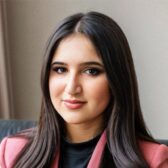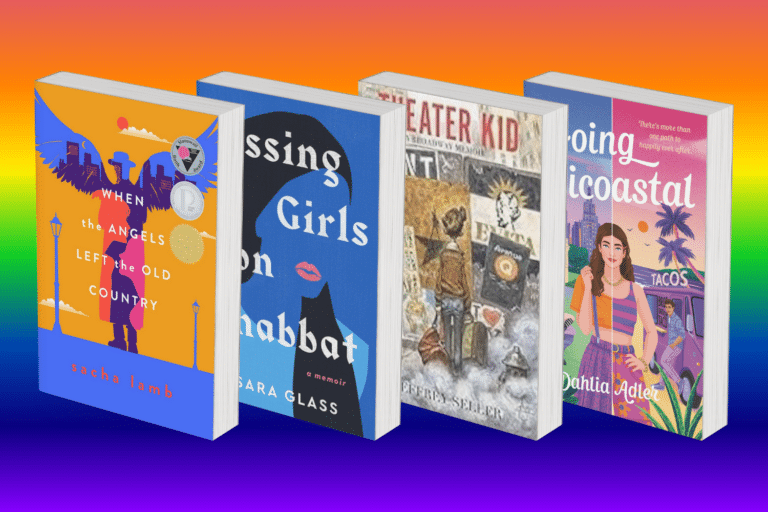
Across genres, generations, and geographies, LGBTQ+ Jewish authors and characters are claiming space in literature: telling messy love stories, reimagining tradition, surviving and thriving in the face of loss, and simply kissing girls on Shabbat.
This Pride Month, we’re spotlighting books that celebrate the beautiful intersection of queerness and Jewish identity. Some are quiet and tender, others loud and defiant. Some are steeped in mysticism, others grounded in realism or speculative futures. All of them remind us that there’s no one way to be Jewish, or queer — and that both are richer when they’re in conversation.
Whether you’re looking for sapphic yearning in a frozen yogurt shop, trans angels on an Ellis Island–style journey, or gay romance with a side of kugel, these stories have something to offer. So grab a book and celebrate Pride the most Jewish way possible: through stories.
Read more: Unpacked’s top Jewish book picks for 2025
“Finally Fitz” by Marisa Kanter
Ava “Fitz” Fitzgerald is finally ready to come out as bi and as herself. But when your mom’s a political powerhouse, your ex-best friend is suddenly everywhere, and your crush might be too cool to notice you, coming out isn’t exactly simple. This sharp, funny YA novel follows Fitz as she navigates high school, heartbreak, and what it really means to live your truth.
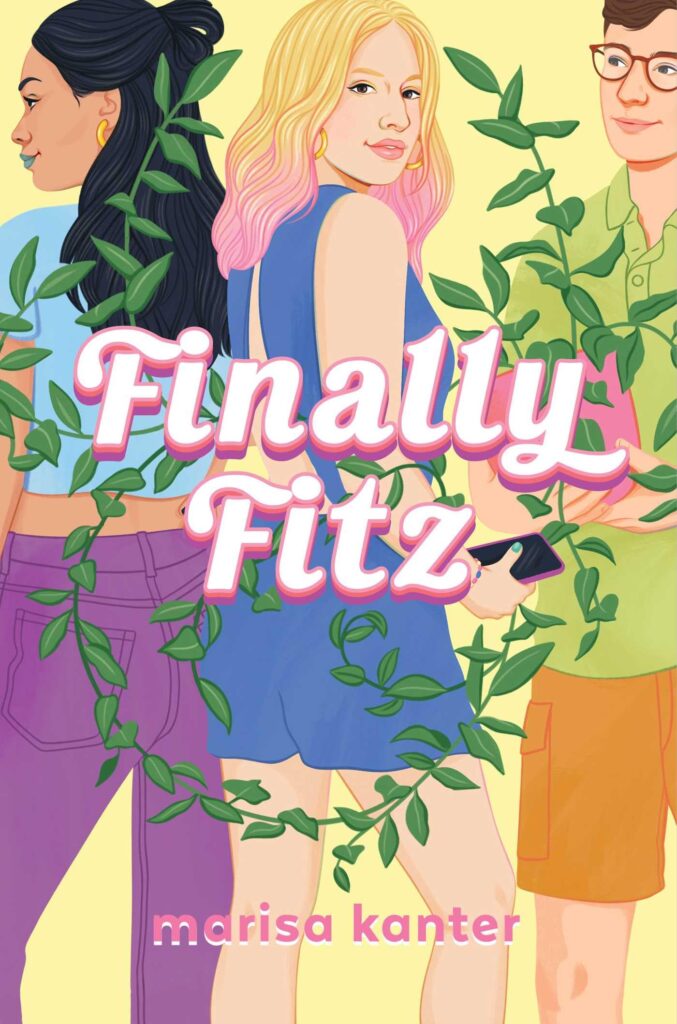
With a proudly Jewish protagonist who explores her Jewish identity throughout the novel, “Finally Fitz” celebrates queer identity, messy emotions, and the importance of writing your own story — even when it’s complicated.
“When the Angels Left the Old Country” by Sacha Lamb
A magical, heart-tugging queer fantasy set in a tiny Eastern European shtetl, this novel introduces Uriel, a devoted angel, and Little Ash, a curious demon, who have studied together for centuries. When a young emigrant from their village vanishes on her journey to the United States, these two celestial beings, representing opposing realms, are sent to find her. Instead, they find themselves entwined in human lives and dilemmas much more complex than any divine mandate.
Staying with her aunt in Prague, aspiring violinist Ilana discovers a forgotten Jewish cemetery — and encounters Benjamin, a warmhearted ghost who shows her an enchanted city full of secrets. Together, they embark on a quest that blends folklore, Jewish tradition, and the bittersweet pull of change.

Rich with Jewish mysticism, Yiddish-tinted language, and the bittersweet reality of emigration, “When the Angels Left the Old Country” is a lyrical heroine’s journey. It weaves together themes of loss, belonging, and the invisible forces that shape our identities, making it perfect for readers seeking a fantasy grounded deeply in Jewish culture and emotional heart.
“The City Beautiful” by Aden Polydoros
Alter Rosen came to Chicago dreaming of a better life, hoping to earn enough to bring his family over from Romania and free them from persecution. But his plans are shattered when his best friend, Yakov, becomes the latest in a string of murdered Jewish boys, and Alter’s life takes a dark, supernatural turn.
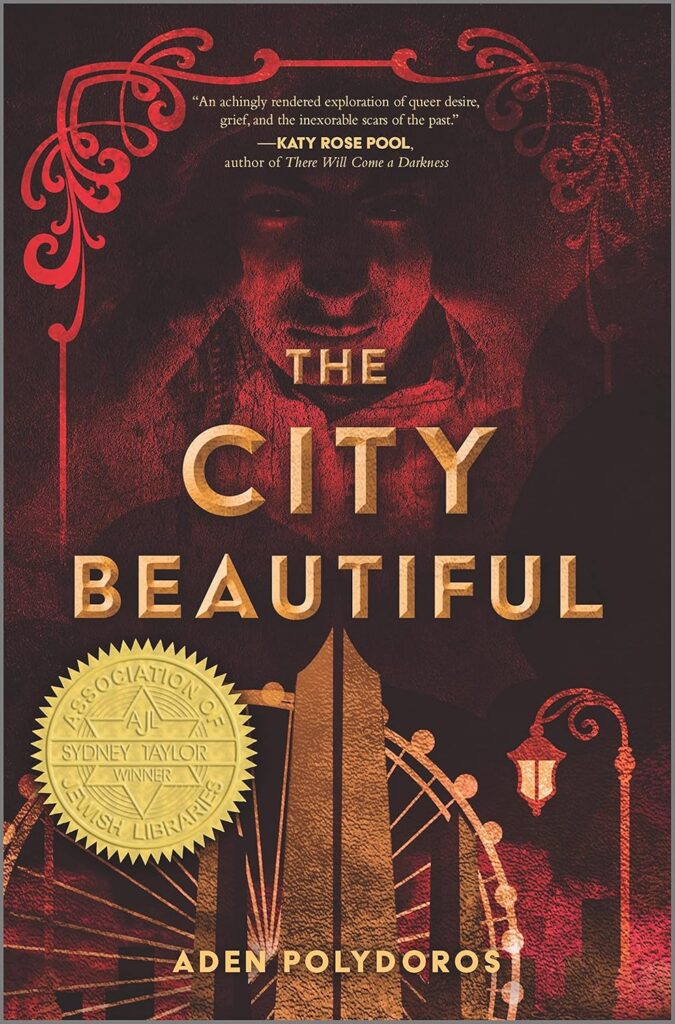
As Chicago celebrates the wonders of the World’s Fair, Alter is thrust into a chilling mystery. Possessed by Yakov’s dybbuk, he’s forced into a shadowy underworld of lies and corruption — and right back into the orbit of a dangerous boy from his past, one he’s never truly forgotten. With Yakov’s spirit haunting him, Alter has only a few days before the possession takes over entirely.
In a desperate race against time, he and his old flame must track down the killer before they become the next victims. Together, they’re drawn into a harrowing fight for survival, where hidden truths and old loyalties are tested, and where the price of freedom may be higher than Alter ever imagined.
What will become a queer, YA classic, Aden Polydoros’ exploration of grief and desire is a masterclass in historical fantasy and integrating Judaism and fantasy.
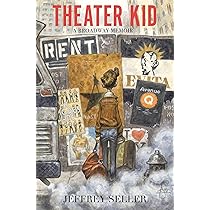
“Theater Kid” by Jeffrey Seller
Before he produced “Rent,” “Hamilton,” and “In the Heights,” Jeffrey Seller was just a shy, adopted Jewish kid from the Detroit suburbs with a flair for flair and a deep love of musicals. In this funny and heartfelt coming-of-age memoir, Seller revisits his teen years discovering theater, navigating his queer identity, and dreaming big from the back row of the auditorium.
“Theater Kid” is a love letter to the stage, but also to the spaces — Purim plays, theater troupes, chosen families — where LGBTQ+ kids have long found the freedom to shine. For anyone who grew up memorizing cast albums and feeling a little different, Seller’s story is both relatable and inspirational.
“Milk Fed” by Melissa Broder
Twenty-four-year-old Rachel is a secular, queer Jewish woman in Los Angeles — working at a talent agency by day and doing stand-up by night — who’s turned calorie-counting into an obsession and sees thinness as a kind of religion. Her world begins to unravel when she meets Miriam, a warm, plus-size Orthodox Jewish woman behind the counter at her favorite frozen‑yogurt shop. Miriam introduces Rachel not just to indulgent meals from frozen sundaes, kosher Chinese food, and homemade challah, but to a radical reclamation of faith, body image, and desire.

Rachel and Miriam’s connection unfolds as a slow-burning, sensual lesbian romance — filled with vividly raw, sometimes uncomfortable intimacy that mirrors Rachel’s journey from control to surrender Alongside their desire, the novel delves into Jewish mysticism (including golem legends and dreams of Rabbi Loew ben Bezalel) and the importance of ritual and community as a Shabbat dinner becomes an act of spiritual and bodily nourishment.
“Milk Fed” is a fierce, unapologetic story about hunger in all its forms — emotional, sexual, spiritual — and about the courage it takes to feed your soul. It’s perfect for readers hungry for a bold, queer-affirming, Jewish-infused narrative that isn’t afraid of mess, hunger, or pleasure.
“Camp” by L.C. Rosen
Randy Kapplehoff has made it his mission to win over his summer crush, Hudson Aronson-Lim, at Camp Outland.
Hudson is only interested in boys who are straight-presenting and barely knows theater-loving Randy even exists. However, at 16, Randy is determined to make himself noticed, reinventing himself into his alter ego “Del,” who is masculine, focused on fitness, and everything Randy isn’t.
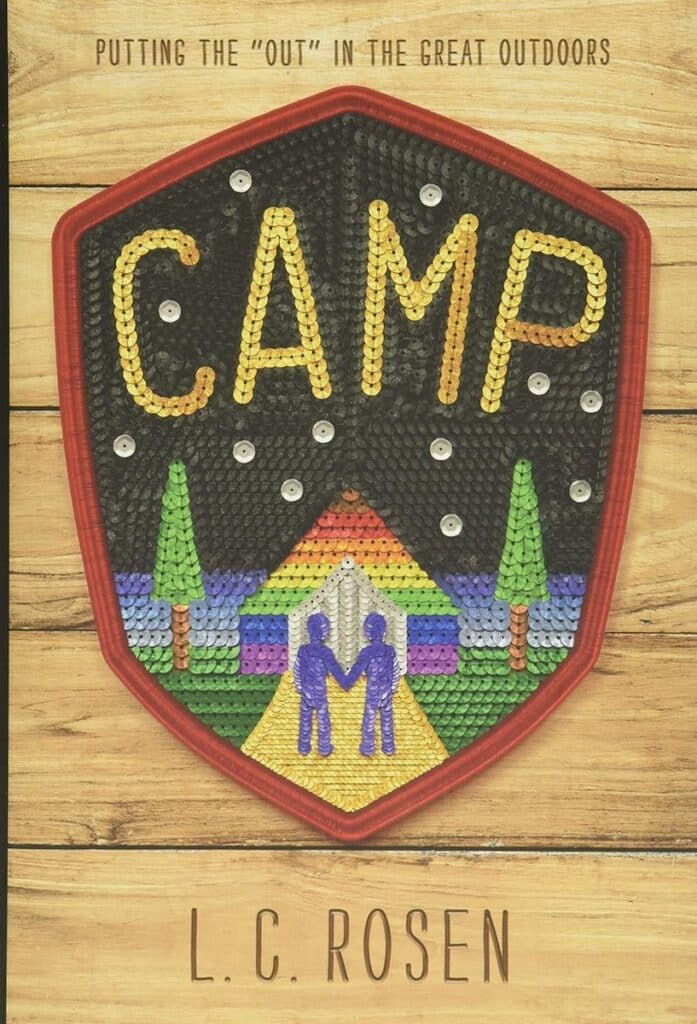
He doesn’t even care that becoming Del means giving up musicals, his unicorn bedsheets and nail polish if he can date Hudson at the end. However, as the duo gets closer, Randy begins to question the lengths he is willing to go to for Hudson to love an inauthentic version of himself.
L.C. Rosen’s “Camp” is a love letter to our first camp crushes and the importance of being true to yourself amid outside pressures. This adorable YA rom-com will leave you giddy and reminiscing about the joys of summer camp.
“Yentl the Yeshiva Boy” by Isaac Bashevis Singer
First published in 1962, this groundbreaking short story follows Yentl, a young Jewish woman in 19th-century Poland who disguises herself as a man to study Talmud, forbidden to women at the time. As “Anshel,” she enters the all-male world of the yeshiva and develops a complex emotional bond with another student, blurring the lines between gender, love, and identity.
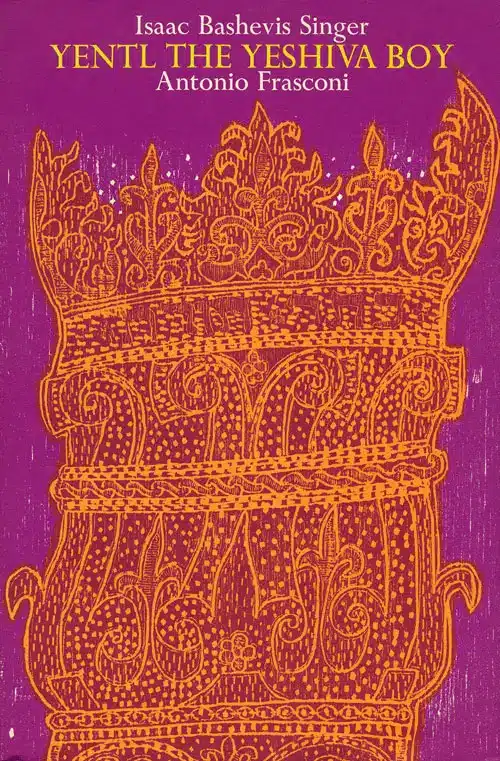
Isaac Bashevis Singer’s tale is steeped in Jewish tradition but radically ahead of its time in exploring queerness, gender nonconformity, and the spiritual cost of living in disguise. Famously adapted into a Barbra Streisand musical (with a very different ending), the original story is quieter, stranger, and queerer, making it a must-read for Pride and beyond.
“Keep This Off the Record” by Arden Joy
Abigail Meyer and Freya Jonsson are sworn mortal enemies — at least they think they are. A decade after high school, they run into each other again, and their rivalry ensues.
However, when both Abigail and Freya’s best friends start falling for each other, they must put their feelings aside. Now that they can’t stop seeing each other, their previous feelings of hatred begin to develop into something more.
“Keep This Off the Record” is a Jewish, queer retelling of “Much Ado About Nothing” and is an enemies-to-lovers story that’ll keep you riveted for the whole novel.
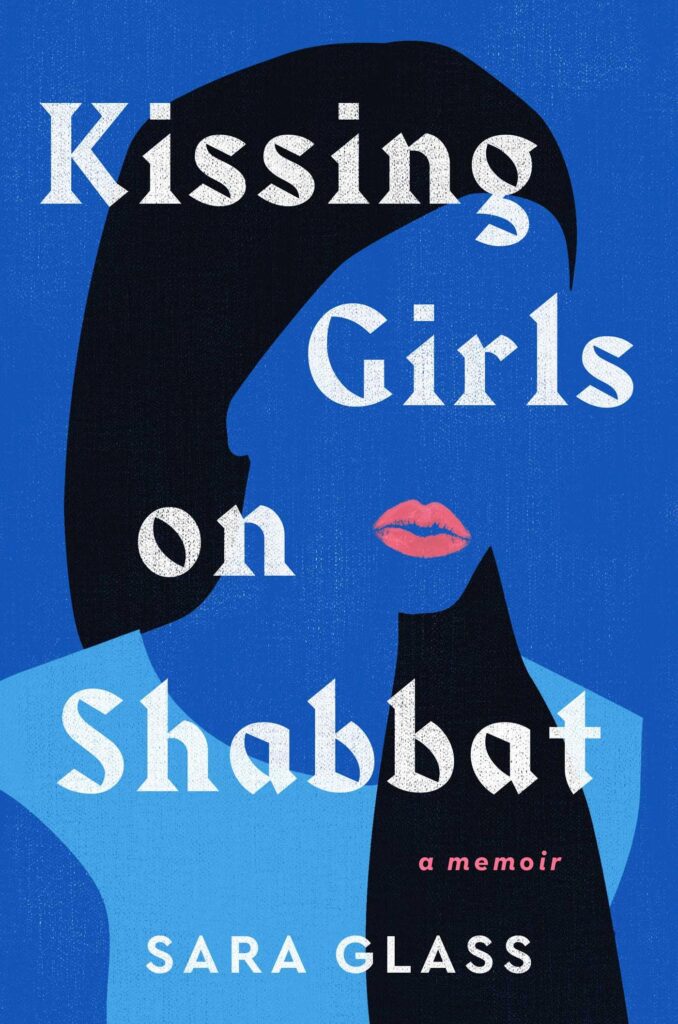
“Kissing Girls on Shabbat” by Sara Glass
Raised in the ultra-Orthodox Hasidic community of Brooklyn, Sara Glass was taught that her life would follow a very specific path: marriage, motherhood, obedience. But even as a teenager, she knew she was different — she was falling in love with girls. What follows is a brave and deeply personal journey: through an arranged marriage, motherhood, heartbreak, and ultimately, the decision to leave her insular world to live openly and authentically.
Told with raw honesty and quiet defiance, “Kissing Girls on Shabbat” is a powerful memoir about reclaiming identity in the face of religious expectations. It’s a story of queerness and faith, of loss and resilience, and of what it means to embrace your truth—even when it costs you everything. A moving reminder this Pride Month that coming out isn’t just about identity—it’s about survival, too.
“Girls Girls Girls” by Shoshana von Blanckensee
In the summer of 1996, secret girlfriends Hannah and Sam leave Long Beach, New York, for San Francisco, chasing freedom and the dream of living openly in a queer haven.
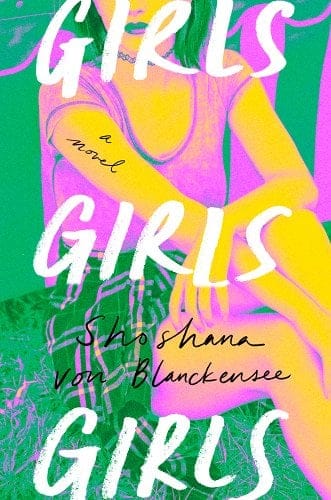
But the move brings challenges: financial strain pushes them into stripping at The Chez Paree, a secret Hannah hides from her devout Orthodox Jewish family. While Sam embraces the job, Hannah struggles, feeling trapped between her girlfriend’s expectations and her own discomfort.
When Hannah meets Chris, an older, complicated butch lesbian, she’s drawn to her attention and the chance to escape the club. Proposing an escort arrangement with Chris, Hannah steps into a new, messy world that drives a wedge between her and Sam. Alone, Hannah must confront who she is without Sam and whether San Francisco is the paradise she imagined — or another place she doesn’t belong.
If you’re looking for a queer, coming-of-age novel, Shoshana von Blanckensee’s debut is a great place to start.
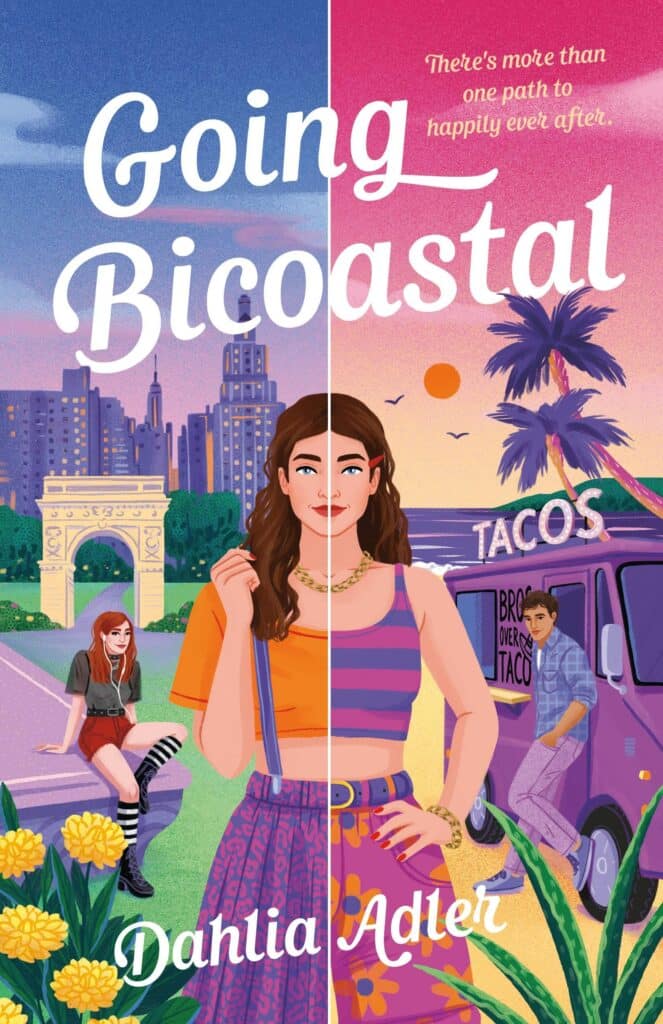
“Going Bicoastal” by Dahlia Adler
Two coasts, two summers, two versions of one Jewish bisexual teen’s life. When Natalie faces a choice between staying in New York City with her dad or spending the summer in Los Angeles with her estranged mom, “Going Bicoastal” splits into parallel timelines — one in which she falls for a girl, and one in which she falls for a boy. Both romances are sweet, real, and reflective of the many ways identity and choice shape who we become.
With its clever structure and casual, affirming representation of both queerness and Jewish life (think: Shabbat dinners, brisket, and summer internships), this rom-com offers more than just romance: it’s about family, belonging, and the freedom to explore multiple paths. Perfect for fans of “Heartstopper.”
‘Night Owls’ by A.R. Vishny
In this thrilling paranormal YA romance, two estries — owl-shifting vampires from Jewish folklore — must navigate New York’s monstrous underworld to save the girl one of them loves, with help from the boy one of them fears.
Clara and her sister Molly have survived over a century by following strict rules: run their historic theater by day, shift into owls by night, feed on men in secret, and never fall in love. But Molly’s in love with Anat, and she’s ready to risk it all, bending rules Clara insists they keep. Boaz, cursed to encounter the undead at every turn, secretly wishes Clara felt the same way about him.

When Anat vanishes and the city’s dark underworld rises, Clara and Boaz are forced to work together, facing demons and forbidden desires. To save those she loves, Clara must break all her rules — or risk losing everything in this spellbinding debut by A. R. Vishny.
“Night Owls” is a perfect fit for someone looking for modern takes on Jewish folklore who loves compelling storytelling and impressive world-building.
“The Sins on Their Bones” by Laura R. Samotin
Set in a reimagined 19th-century Eastern Europe inspired by Jewish folklore, “The Sins on Their Bones” follows two ex-husbands on opposite sides of a civil war.
Dimitri Alexeyev, formerly the Tzar of Novo-Svitsevo, lost the civil war started by his former husband, Alexey Balakin. Dimitri and his spymaster, Vasily Sokolov, attempt to regain control.
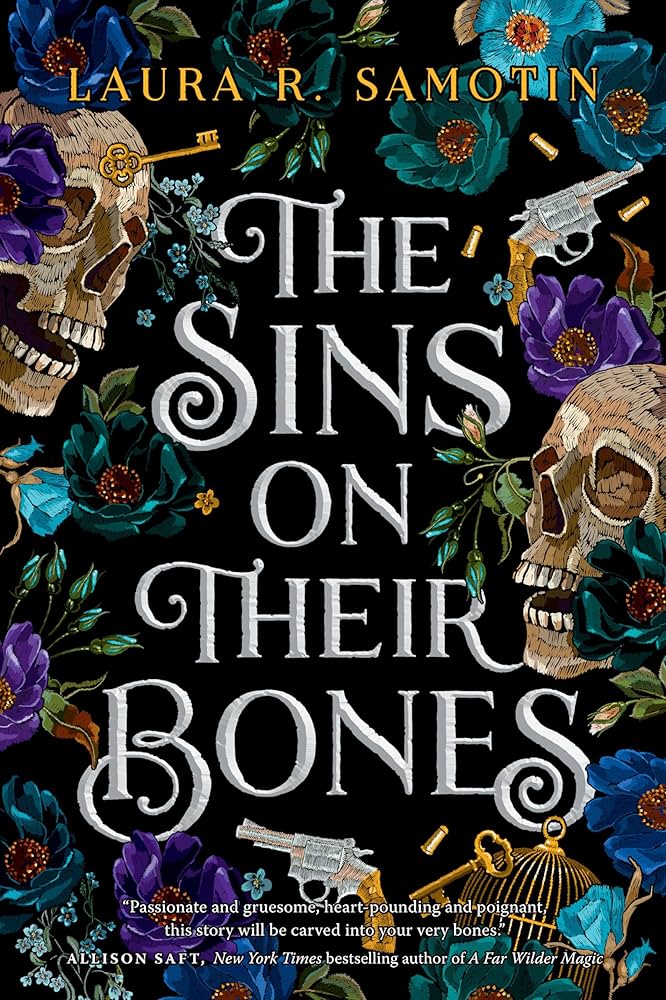
Vasily will join Alexey’s court under a false identity to gain information and power, while Dimitri plans for his ex’s execution.
However, their ruse is harder to pull off than expected, as Alexey has resurrected himself into an immortal using dark magic and claims he is controlled by God. Alexey is now able to summon demons and looks to make Novo-Svitsevo into an empire.
Dimitri must choose whether to save Novo-Svitsevo and kill the husband he can’t forget, or to save Vasily.
“The Book of Anna” by Joy Ladin
In this bold and haunting novel-in-verse, poet and scholar Joy Ladin reimagines the life and afterlife of Anna, a Holocaust survivor institutionalized for believing she’s receiving divine prophecy. As Anna’s voice unfolds across poems, fragments, and testimonies, the book explores themes of faith, trauma, gender, and what it means to speak truths the world isn’t ready to hear.
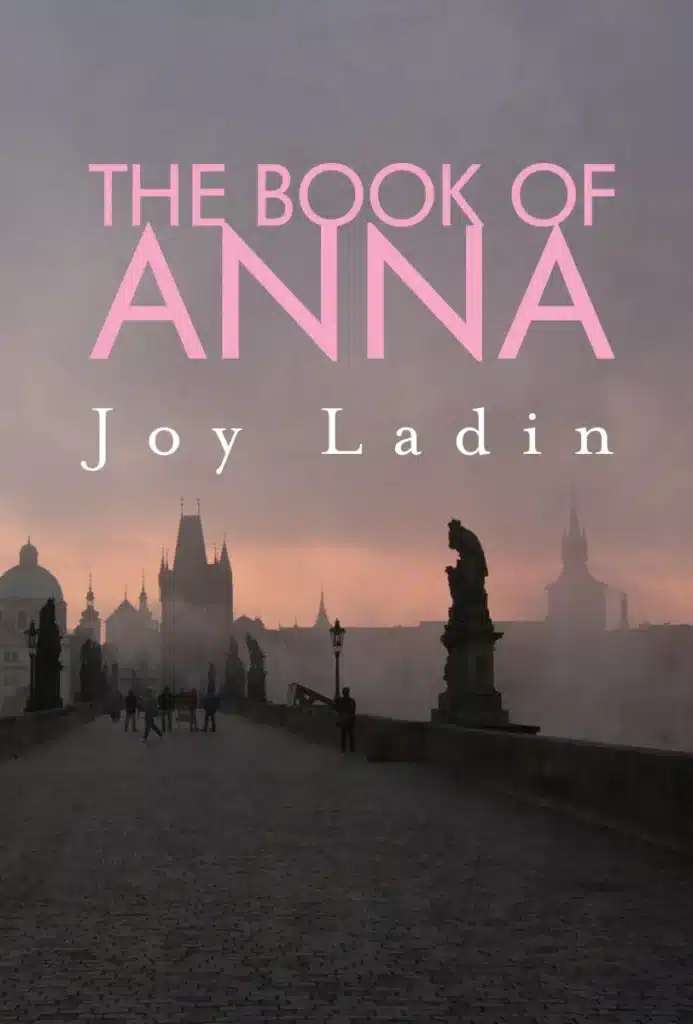
Ladin, a groundbreaking Jewish trans author, infuses “The Book of Anna” with spiritual and philosophical depth. It’s a work that resists categorization, blending Jewish mysticism, queer identity, and post-Holocaust theology into a narrative that is as daring as it is deeply human. A powerful pick for readers interested in the intersections of Jewish history, queer embodiment, and sacred storytelling.
“A Half‑Built Garden” by Ruthanna Emrys
In a climate‑scarred near future, Judy Wallach‑Stevens — a Jewish, queer scientist — is working to heal Earth as part of a cooperative Chesapeake watershed network. When her baby daughter and wife wake with her one evening, they stumble upon an alien first contact: two matriarchal species convinced humanity must leave Earth behind
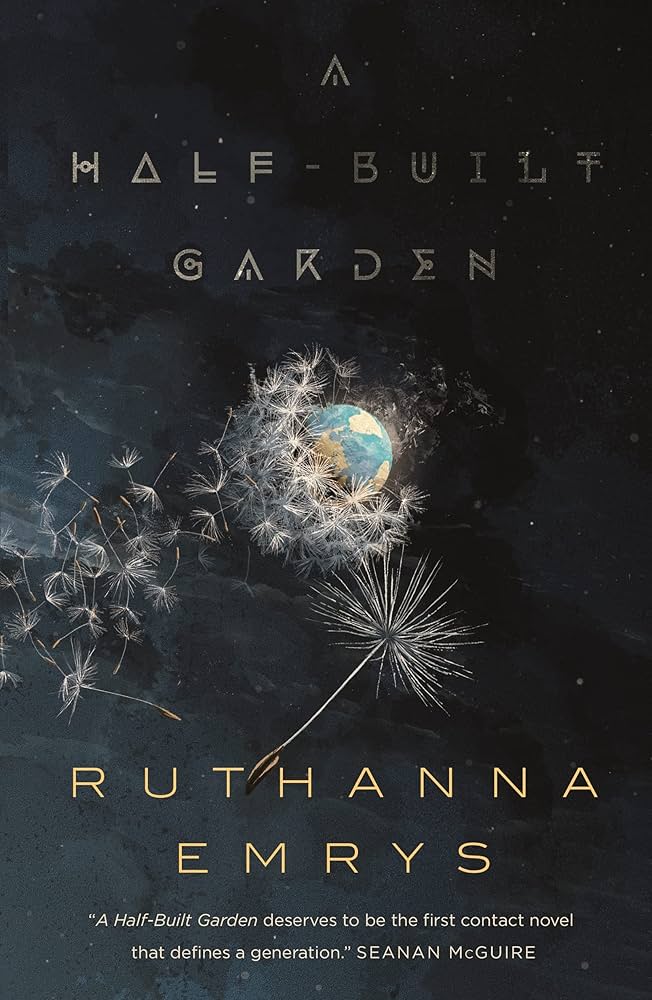
The story weaves together eco‑diplomacy, motherhood, and rituals like a Passover seder that grounds their Jewish life even amid cosmic upheaval. Judy’s queer family unit — complete with her wife Carol and co‑parenting network — models a future built on chosen bonds and mutual care.
This queer‑Jewish‑feminist science fiction novel is rich with dialogue about identity, gender expression, and consent woven seamlessly into ecological and alien diplomacy. “A Half-Built Garden” is a tender, thoughtful story of love and survival rooted in Jewish tradition, queer family, and planetary healing.
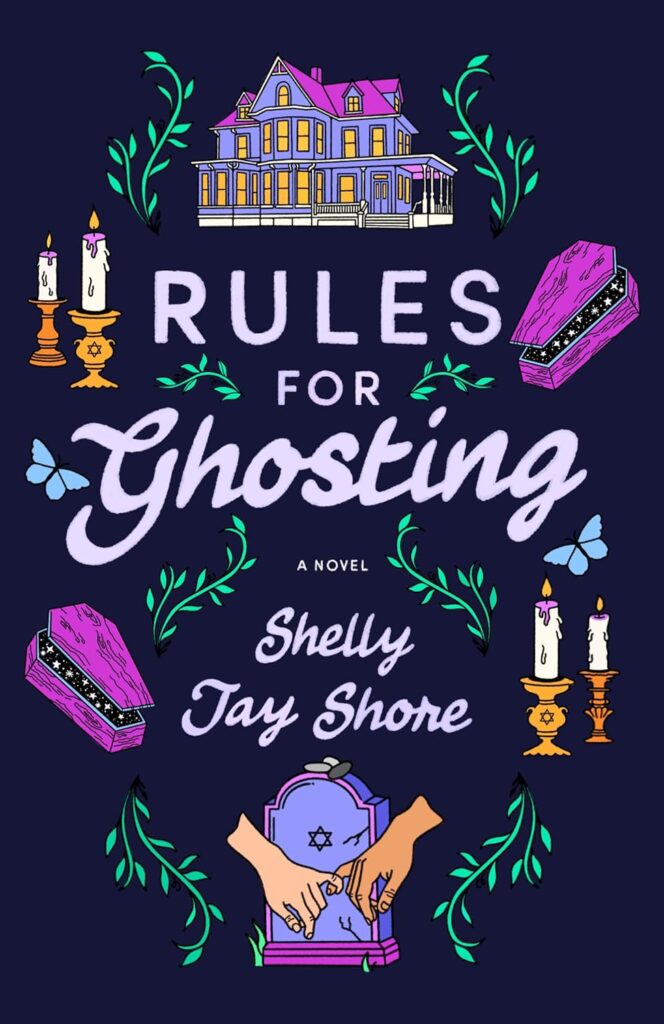
“Rules For Ghosting” by Shelly Jay Shore
Ezra Friedman grew up seeing ghosts, which made life in a funeral home…complicated. His grandfather’s ghost disapproves of everything, especially Ezra’s HRT-induced second puberty, and he’s under constant scrutiny from living and dead relatives alike. So, it’s no surprise Ezra ran as far as he could from the family business.
But when his dream job collapses, and his mom announces she’s leaving his dad for the rabbi’s wife at Passover, Ezra ends up back at the funeral home, now teetering on financial ruin. To help, he steps into his mom’s role, facing long days surrounded by ghosts only he can see—including Jonathan, the charming funeral home volunteer living downstairs, and Jonathan’s late husband, Ben, whose ghost is breaking all the rules by speaking, moving, and stirring up feelings Ezra never expected.
As Ezra fights to keep his family — and his heart — intact, he learns that being haunted comes in many forms.
Shelly Jay Shore’s best selling debut novel is the perfect queer, Jewish spooky tale of self-discovery, family and love.

“Mazeltov” by Eli Zuzovsky
In a grand banquet hall overshadowed by the looming threat of war, Adam Weizmann’s bar mitzvah takes an unexpected turn into an unforgettable disaster. Straddling the fragile line between boyhood and adulthood — and on the verge of unraveling — Adam faces a day he’s long awaited, set against the backdrop of his family’s eccentricities and a nation in turmoil.
This pivotal moment in Adam’s life unfolds through a chorus of perspectives. His father, newly devoted to faith, introduces unsettling rituals that leave their mark. Abbie, his daring best friend, pulls him toward rebellion and freedom. Khalil, a Palestinian poet, provides a poignant vision of a life beyond the conflict. Meanwhile, Adam wrestles with his own confusion and longing, grappling with the fractured reality of his world and his place within it.
“Mazeltov” is an astounding debut by Israeli author Eli Zuzovsky that’s worth the read.
“This Spells Disaster” by Tori Anne Martin
In Tori Anne Martin’s witchy, Jewish queer love story, is the perfect cozy read. “This Spells Disaster” is a perfect fit for readers of the fake dating trope and supernatural romance.

Potion maker and self-described “messy witch” Morgan Greenwood is sure she was hexed at birth. She drunkenly offered to fake-date her dream woman, Rory Sandler — the spellcasting champion — and somehow, Rory agreed! But as they gear up to keep up the ruse at the New England Witches’ Festival, things start to feel all too real. Then, Morgan realizes she might’ve accidentally given Rory a love potion instead of a calming draft, breaking a major Witch Council law.
Now, she has to keep up the act, fool Rory’s family, and somehow break the love potion by proving they’re totally wrong for each other. But each day, Morgan finds herself more enchanted by Rory and wondering if maybe, just maybe, the magic between them isn’t fake at all.
“Call Me By Your Name” by André Aciman
Set against the golden backdrop of an Italian summer, “Call Me By Your Name” is a lush, sensual coming-of-age novel about first love, desire, and the imprint it leaves. When 17-year-old Elio meets Oliver, the American grad student staying at his family’s villa, the two are drawn into an intense, transformative romance that unfolds with all the urgency and ache of youth.
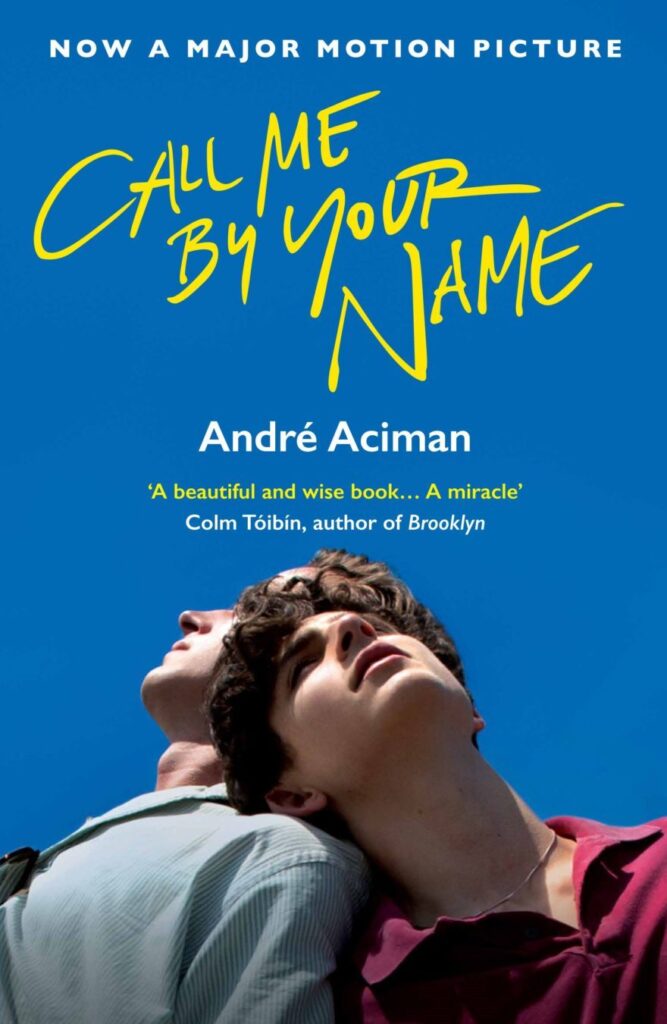
Both Elio and Oliver are Jewish, and while their shared heritage is a quiet thread in the story — marked by references to names, traditions, and a subtle awareness of difference — it deepens the novel’s exploration of identity, belonging, and love outside the mainstream. Jewish-Egyptian author André Aciman’s prose is intimate, poetic, and unforgettable.
Plus, once you’ve devoured the novel, check out the film adaptation starring Jewish actor Timothée Chalamet.
“The Punk‑Rock Queen of the Jews” by Rossi
Raised in an Orthodox Jewish family in suburban New Jersey, Rossi was expected to grow up “a good kosher Jewish girl” and marry a nice Jewish boy. But by age 16, she was rebelling with pink hair, punk rock shows, pot, and falling in love with girls — until her parents forcibly took her to Crown Heights to live under an ultra‑Orthodox rabbi’s rule.
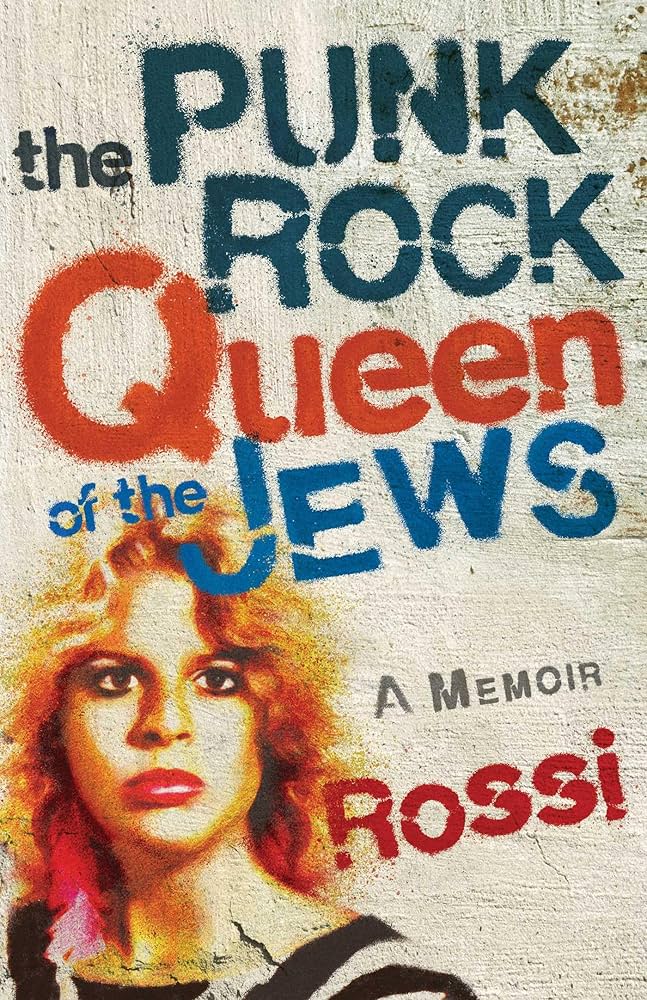
What follows is a fierce, true coming‑of‑age tale: she endures enforced modesty and isolation; confronts misogyny, homophobia, and even sexual violence; yet never loses her spirit or neshama (soul). Rossi’s queer identity pulses through every page — her coming out, her attraction to women, her refusal to be silenced — even as she grapples with her Jewish roots.
Blazing through 1980s NYC’s club scene and Orthodox backstreets alike, “The Punk‑Rock Queen of the Jews” is a raw, unapologetic memoir of resilience, punk‑fueled queerness, and the reclamation of faith on one’s own terms. It’s a story about choosing your identity, your music, your community, and your truth.
“Wide Awake Now” by David Levithan
Set in the real 2024, David Levithan’s sequel reimagines his 2004 “Wide Awake” in a world where America has just elected its first gay, Jewish president: Abraham Stein. Jewish high school senior Duncan and his boyfriend Jimmy are more than thrilled; for them, this is personal validation. But when a conservative governor refuses to concede and calls for a recount in Kansas, President‑elect Stein urges supporters, including teens, to join a peaceful protest.

Through Duncan’s eyes, we witness how love, faith, and activism collide. It’s a queer romance set squarely in the political sphere: Duncan and Jimmy volunteer, travel, and clash with rising bigotry — all while grappling with their own relationship and identity. The narrative pulses with hope, tension, and the messy truths of being queer, Jewish, and politically engaged in turbulent times.
“The Upside of Unrequited” by Becky Albertalli
Seventeen-year-old Molly Peskin-Suso has had 26 crushes and zero kisses. As her confidently queer twin sister Cassie dives headfirst into a new relationship, Molly starts to wonder if love is something that will ever happen for her. Enter two very different boys—one a perfectly dreamy hipster, the other her awkward coworker at a Jewish gift shop who’s somehow worming his way into her heart.
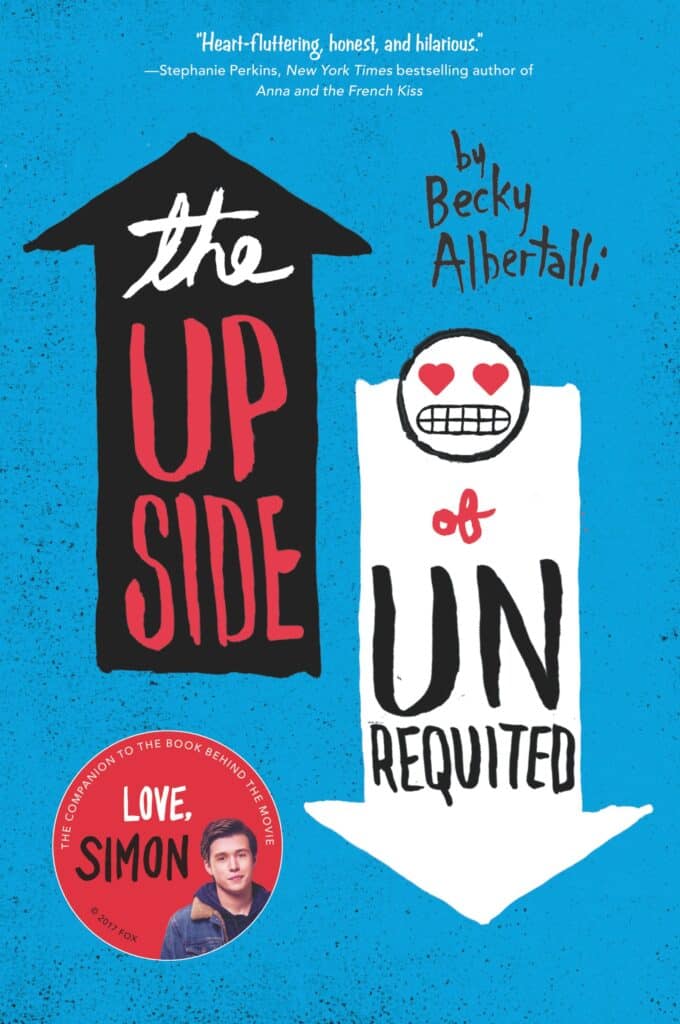
Set in a warm, proudly Jewish family with two moms, this charming YA rom-com is full of messy feelings, body positivity, sisterhood, and queer joy. The second installment in Becky Albertalli’s “Simonverse” (all of which have queer and Jewish representation), “The Upside of Unrequited” is for anyone who’s ever felt like the late bloomer in a world of romantic overachievers.
“Teacher of the Year” by M.A. Wardell
Kindergarten teacher Marvin Block is adored by his students and by his community as a neuro‑spicy, Jewish man navigating anxiety and ADHD. When he’s nominated for Teacher of the Year (a win that could save his school), his orderly life gets upended by Olan: the single, handsome father of a new student.

What begins as friendship — late‑night classroom talks, shared concerns for Marvin’s class — slowly blooms into more. Marvin, openly gay, and Olan, newly questioning his sexuality while co‑parenting, find themselves navigating consent, trust, and emotional scars from trauma, addiction recovery, and past heartbreak as their chemistry becomes impossible to ignore.
“Teacher of the Year” is a tender friends‑to‑lovers queer romance, grounded by Marvin’s Jewish community (Yiddish quirks, familial noshes, and sharp wit), that balances heartwarming warmth with spicy intimacy. It’s a beautifully layered celebration of chosen family, faith, resilience, and the courage it takes to open your heart when everything’s on the line — a Pride Month pick for anyone who believes love is worth the leap.
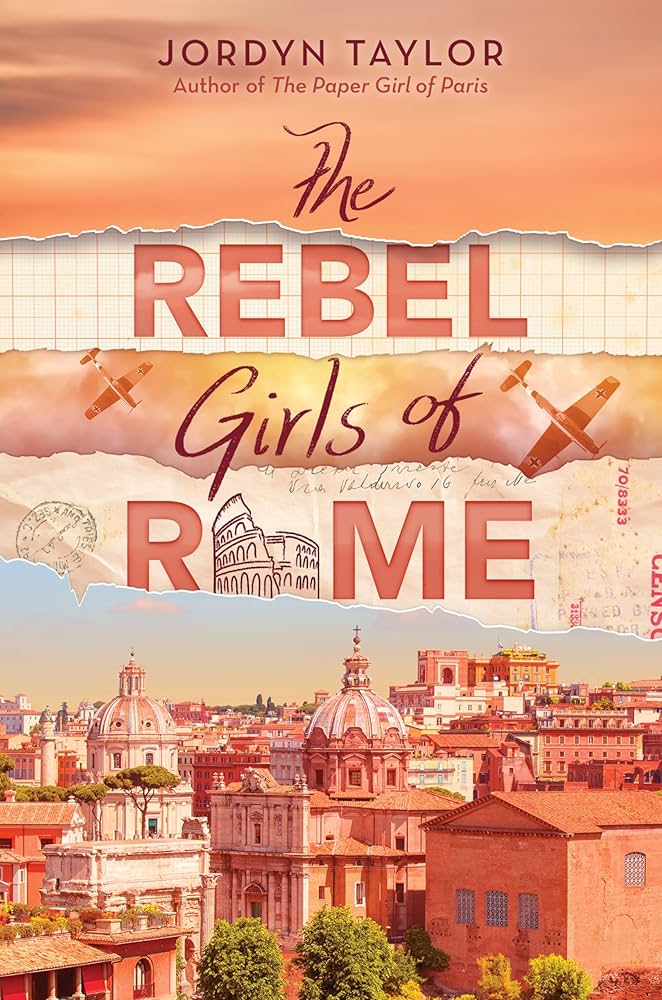
“The Rebel Girls of Rome” by Jordyn Taylor (Coming July 8, 2025)
This upcoming historical YA novel jumps between World War II–era Rome and the present day, following two Jewish women separated by generations but connected by family, identity, and resistance. In 1940s Italy, Bruna — queer, Jewish, and newly orphaned after her family’s deportation — joins the anti-fascist underground, risking everything for love and freedom. In the present, Lilah travels to Rome with her grandfather to uncover long-buried family secrets and reclaim a history nearly lost to time.
With a queer romance at its heart and Jewish survival woven throughout, “The Rebel Girls of Rome” is a powerful reminder that both love and resistance come in many forms. Mark your calendars: This one hits shelves in July, just after Pride Month — but trust us, it’s worth the wait.
Originally Published Jun 22, 2025 08:45AM EDT

